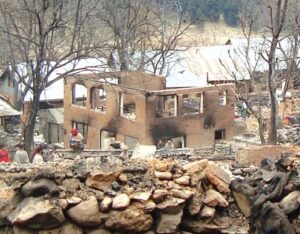
South Asia’s Nuclear Flashpoint Has Reared its Head Again!
Muhammad Iqbal Tantray
Kashmir has always been the nuclear flashpoint of South Asia. Besides a contested land, it has been a ticking time bomb buried beneath the snow-capped peaks and blood-stained valleys. Its unresolved status continues to cast a dark shadow over the entire region and threatening South Asia and the fragile equilibrium of the wider world. With two nuclear-armed neighbours – arch-rivals bound in a seventy-five-year-old animosity – locked in an ideological and territorial tug of war, the threat of escalation remains real and inevitable. This is a longstanding dispute and a volatile standoff with radioactive consequences.
India has always mistaken silence for surrender. It reads the occasional silence of Kashmiri people or international outcry as a sign of submission, as if the silence of the oppressed translates into the victory of the oppressor. But in a conflict zone like Kashmir, silence is not peace. It is the deep breath before the storm. India fails to grasp that in occupied lands, calm is a façade, often enforced at gunpoint, where the lull in resistance is merely the result of unrelenting militarisation and manufactured fear. What does victory mean in a place where resistance is older than the occupier’s propaganda?
As long as the last Kashmiri walks the soil of his homeland with defiance in his heart, the threat of a flashpoint escalating into catastrophe remains constant. The illusion of control that India projects is built on checkpoints, bunkers, surveillance drones, and the ever-growing shadow of military boots. But history has never been kind to empires that tried to bury the will of a people under the rubble of repression. You cannot imprison an entire nation behind concertina wire and expect submission to become tradition. You cannot turn valleys into open-air prisons, deploy millions of troops to suppress thought and soul, and believe that such tyranny will write itself into permanence. Aspiration does not die under siege, rather it sharpens.
Many sane voices have warned the world of the nuclear danger that Kashmir represents. The literature on Kashmir’s political status is replete with chilling foresight. Writers, statesmen, and diplomats have repeatedly underlined that the only sustainable solution lies in allowing the people of this tormented land to exercise their inalienable right to self-determination. But India, gripped by a colonial hangover and an inflated self-image of being the world’s largest democracy, continues to weave false tales of normalcy. It sells peace where it sows panic, and markets democracy where it practices occupation.
In 1953, Ralph Bunche, a senior United Nations official, observed that “Kashmir is the one situation you could never localize if it should flare up. It would influence the whole Muslim world. It is potentially the most dangerous in the world.” These words uttered in the infancy of the nuclear age now echo with a terrifying clarity. But India, consistent in its obstinacy, chose to ignore such warnings. Instead, it fortified the scaffolding of its occupation, unleashing brute force upon a population whose only crime has been their refusal to forget who they are.
Today, with the RSS-led BJP tightening its grip over Indian polity since 2014, a dangerous new era of fanaticism has dawned. The Hindutva-driven state machinery has acted with impunity, implementing iron-fist policies in Kashmir while stoking anti-Pakistan hysteria to gather votes across the mainland. The rhetoric grows shriller, the crackdown grows harsher, and the distance between New Delhi and the truth grows wider. The global community cannot ignore this anymore. The international silence, masquerading as neutrality, has only emboldened the oppressor and deepened the suffering of the oppressed. Every muted response from world powers is a tacit approval of repression.
Since August 2019, when India unilaterally abrogated Article 370 and dissolved Kashmir’s semi-autonomous status, the region has hovered on the brink of disaster multiple times. Each time, it has taken little more than a border skirmish, any action by resistance fighters, or, surprisingly, even a false flag, to bring two nuclear powers to the edge of confrontation. And in these moments, the world holds its breath and forgets that the cause of that breathlessness is a political miscalculation and a decades-long refusal to acknowledge the core issue.
It is high time that India sheds its arrogance and confronts the inevitable truth: no durable peace can be forged by force. Let Kashmiris decide their future in accordance with UN resolutions. Honour the promises made at the highest international platforms. Repeal the occupation. Restore dignity. Only then will the mountains of Kashmir stop trembling with the silence of unshed tears and unburied hopes.
Until then, the nuclear flashpoint remains – silent, simmering, and one step away from catastrophe.



